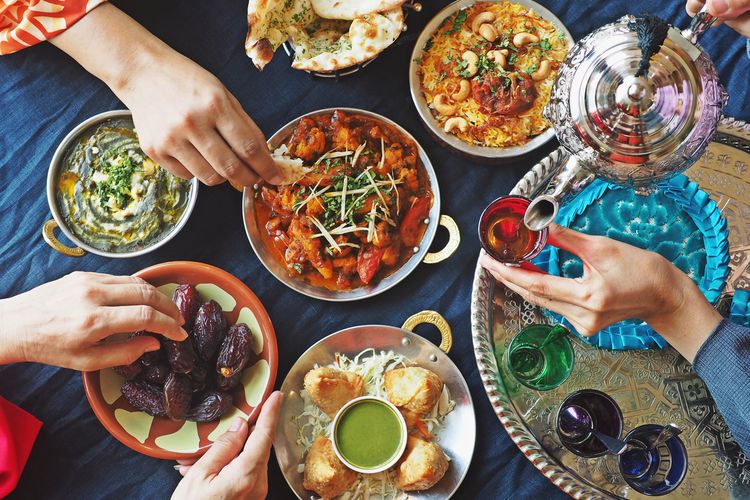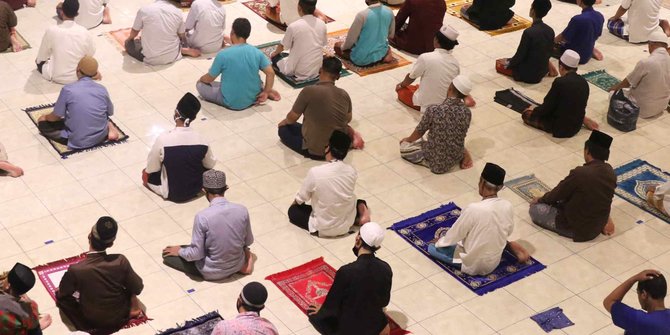This Ramadan is the second time we fast in the midst of a pandemic. Of course, there are significant differences with the month of fasting we were familiar with. Before the pandemic, we were able to freely have an iftar (break the fast) with friends, visit relatives’ houses, looking for roadside snacks before sundown, or carry out the taraweeh (special night prayers) in the mosques. But now, those things have to be done with great vigilance, and we must strictly follow the health protocols.
We are required not to be careless in all movements, no matter how small it is. This is because every activity we do can lead to being infected by the virus. But, that doesn’t mean you cannot do activities outside of homes during this Ramadan. You can do it, but again as long as you adhere to health protocols. Wanna know how? Here are some tips you can follow!
Tips for Doing Iftar (Breaking the Fast) With Friends

Photo: Shutterstock
As stated in the official notice from the Minister of Religion, people are encouraged to break their fast at home. However, if the iftar still needs to be carried out, the attendance must be limited to a maximum of 50% of the room capacity. Not only that, but you also have to pay attention to several other things, Smartcitizen.
Choose a place that is not too crowded so you can keep your distance. Avoid coming during rush hour. If necessary, you can choose an outdoor dining area so there will be sufficient air exchange to minimize the risk of virus transmission;
Make sure you don’t use the same cutlery with others. You can also bring your own from home;
After eating, immediately put your mask back on and don’t hang out for too long. The longer you are in the crowd, the more likely it is for you to be exposed to the virus.
Ethics of Visiting Relatives’ Houses

Photo: Shutterstock
Visiting a relative’s house has become a common culture in the holy month of Ramadan. However, with the pandemic still going on, there are some additional visiting ethics you need to pay attention to.
Before visiting, make sure you are in good health;
Chat or phone the host to ask for a visit permission. If the host doesn’t allow you, you don’t need to be offended. It is usual for people to be more strict in receiving guests during this pandemic, even if you are a relative. But if your relative allows you, you can come;
When you arrive at the relatives’ house, ask him/her whether you can come into the living room or not. If not, you just can chat in the house yard. While you were chatting with your relatives, please don’t forget to wear your mask;
After you’re done, you should go straight back home so you don’t stay in contact with your relatives for too long
Tips for Buying Snacks

Photo: Pexels
Hunting for foods and drinks for iftar is one of the characteristics of Ramadan that we won’t find in any other month. Usually, customers will come to the roadside sellers stalls before sunset prayer. Sometimes, they have to jostle with fellow buyers just to buy the snacks they want. These habits need to be changed during the pandemic. We have to maintain our distance and pay more attention to the hygiene and cleanliness of the purchased snacks.
For example:
Choose food that is sold in clean areas and in closed containers;
Pay attention to whether the seller wears a mask and uses tools for taking the food or not. It’s better if the seller obeys the health protocols and doesn’t touch the foods.
Keep yourself clean. Don’t directly touch the food or its container. If you want to touch something, cover your hands with gloves or tissue first.
Tips for Carrying Out Taraweeh Prayers in Mosques

Photo: Merdeka.com
The holy month of Ramadan is never complete without the taraweeh at the mosque. Fortunately, in this Ramadan, the government allows people to perform Taraweeh prayers in mosques with several provisions, such as the number of attendance that is not more than 50% and the duration of lecture which is limited to a maximum of 15 minutes.
Even though there are provisions from the government and the mosque where we pray at, it doesn’t mean we are allowed to be careless. Various ways can be done so that the prayers remain solemn and safe while still fortifying ourselves from the coronavirus.
Don’t come to or come home from the mosque in groups. By avoiding crowds, you will be more likely to avoid catching the virus;
Perform ablution at home;
Bring and use your own prayer equipments;
Keep your distance when praying. In normal times, we have to tighten our rows when praying in congregation. However, during this pandemic, we are advised to maintain a distance of 2 meters from other worshipers around us.
Keep wearing a mask even though you’re praying.
Those are some tips you can apply in carrying out activities during the fasting month. In the midst of pandemic, we indeed have to obey health protocols, but may this not make our enthusiasm for worship crumble. In fact, maintaining the health and safety of our own selves and others is a religious command we must fulfill along with other acts of worship.
[Tips for Safe and Healthy Fasting During a Pandemic]
If you want to be even safer during outside activities, you can do an independent risk test for Covid-19 by using the JakCLM feature in JAKI application. The app can be downloaded via Google Play Store or App Store. Hopefully, this article could become a reliable source of information for you. Happy fasting and doing good deeds in the month full of blessings, Smartcitizen!
 112
112
 0813 8837 6955
0813 8837 6955
 112
112
 0813 8837 6955
0813 8837 6955
 112
112
 0813 8837 6955
0813 8837 6955